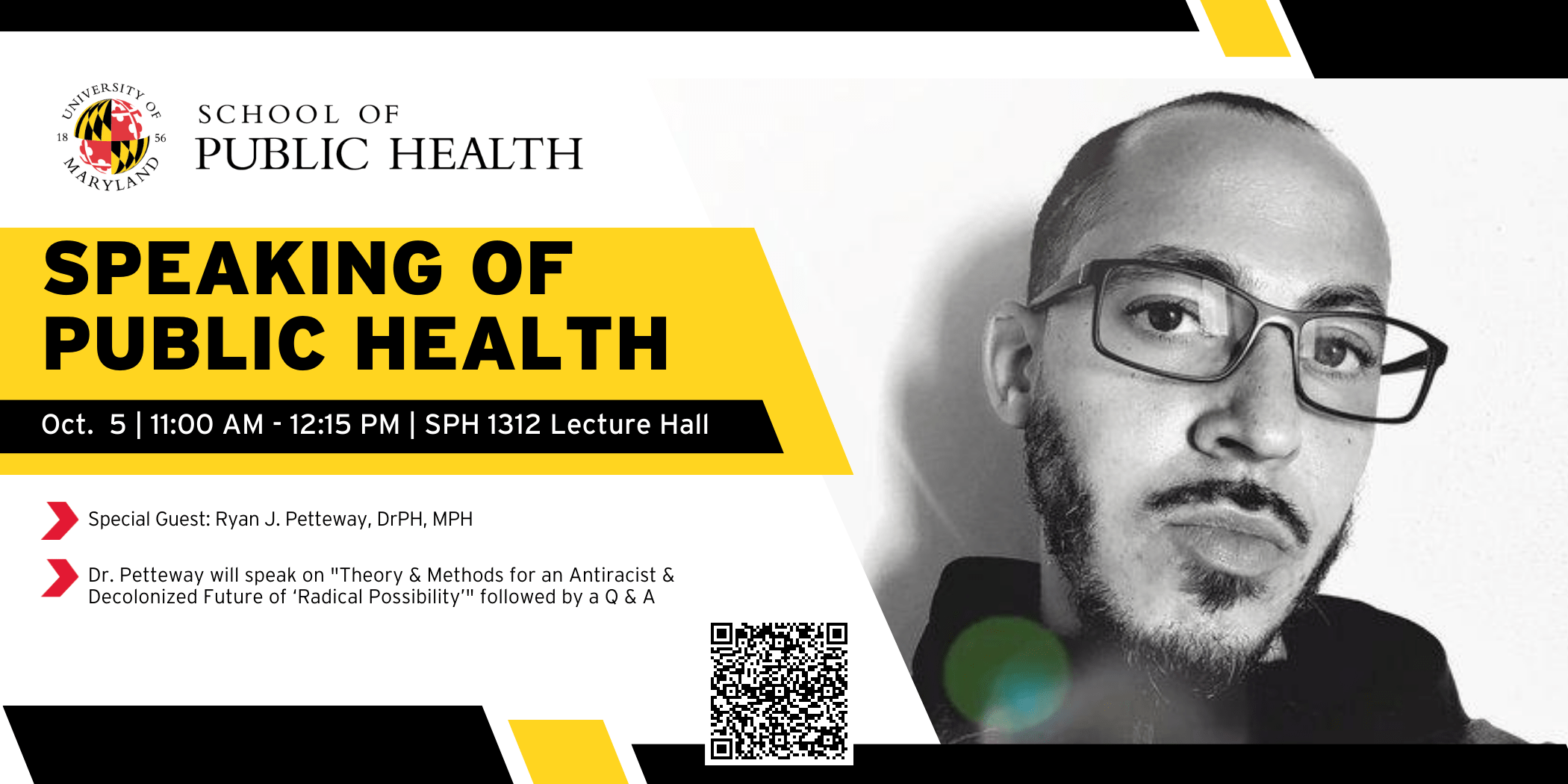
He/Him/His
Associate Professor #TENURED
OHSU-PSU School of Public Health
RESISTANCE. REFUSAL. REMEMORY. RESURGENCE.
Location: 1312 SPH Large Lecture Hall
Join the University of Maryland School of Public Health to kick-off the new seminar series Speaking of Public Health with invited guest Ryan J. Petteway, DrPH, MPH. The seminar series welcomes speakers to our UMD SPH campus to engage and ignite our students, alumni, faculty and staff in understanding and addressing the grand challenges of our time.
Dr. Ryan J. Petteway is a public health professor/scholar and educator who integrates social epidemiology, participatory research, and creative arts to advance health equity. He engages critical, Black feminist, and decolonizing theory and methods to pursue procedural and epistemic justice within public health research/practice, including via music and poetry.
Dr. Petteway will speak on "A People's Social Epi: Theory & Methods for an Antiracist & Decolonized Future of ‘Radical Possibility’" followed by a Q & A. View the seminar abstract below. A small group of graduate students will join Dr. Petteway for a seminar debrief and lunch immediately following (from 12:30-1:30 in the Friedgen Seminar Room).
The event is cohosted by Interim Chair Dr. Craig Fryer, Associate Professor Dr. Jennifer Roberts, and Assistant Dean for Diversity Erin McClure. The event is cosponsored by the UMD SPH Office of the Dean under the leadership of Dr. Boris D. Lushniak and the Department of Behavioral and Community Health under the leadership of Dr. Craig Fryer.
Seminar Abstract:
Public health remains ensconced in a heavily positivist, reductionist, settler-colonial, racial-capitalist “ritual” of knowledge extractivism and expropriation wherein credentialed researchers mine marginalized communities for data to (re)package and (re)distribute as their (our) own knowledge. Much of this work has focused on racial health inequities while, curiously, leaving unexamined matters of positionality, epistemic equity, and procedural justice in the production and curation of knowledges/narratives about racialized subjects (here, perhaps better described as “objects”). Moreover, in the US, this production is dominated and curated mostly by White scholars—from tenure-track faculty positions, to funding review panels, to editorial boards, to peer-review bodies. In short, the public health knowledge production and curation enterprise is structurally racist, and it is time that we confront the inherent contradictions of a health equity discourse that fails to interrogate the racialized power dynamics that animate it. Moreover, it is time that we remix the canon and forge a future field capable of doing our health narratives epistemic (and poetic) justice.
In this spirit, I draw from social epidemiology, critical, Black feminist, and decolonial theory literatures to outline a social epi of “radical openness and possibility” (hooks)—an inclusive space rooted in antiracist and decolonizing praxis for the production of counternarratives within discourse of health (in)equity. I discuss/reflect on applications of participatory and decolonized approaches within my own work that center considerations of epistemic justice, data justice, and narrative power, i.e. research as resistance, refusal, ‘rememory’ (Morrison), and resurgence. In doing so, I articulate a vision of social epi for/as resistance and counternarrative, challenging public health’s history of violence against our bodies, its (re)colonization of our lives, and its (a)political silence on matters of epistemic and social injustice. I further suggest the epistemological, ethical, and material imperative of remixing/reimagining public health knowledge production, expression, and curation practices to more fully—and unapologetically—"center the margins,” with poetry a necessary format of health equity discourse for resistance and healing.